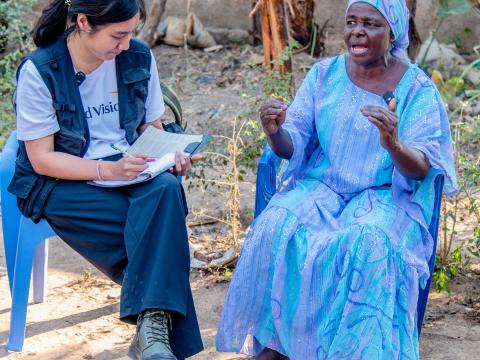DR Congo: From Faith to Action - Empowered World View Approach Strengthened Mbayo’s Commitment

South of Lubumbashi, in the dusty village of Kigoma, dawn breaks with the hum of work and the murmur of Swahili, Bemba, and French. Here lives Annie Mbayo, a pastor, wife, and mother of nine who long carried her family through prayer and quiet endurance.
“I preached and raised my children, but I didn’t know how to think about tomorrow,” she recalls softly.
Her modest income came from selling tree seedlings grown on a small piece of land. Faith guided her, but her horizon remained narrow.
Her turning point came through a meeting with Pastor Iréné, a graduate of World Vision’s Empowered World View (EWV) training. He invited her to a session. Annie listened, reflected, and made a decision.
“I felt it was a calling. I told myself: this is the time to change.”
The EWV approach, which links identity, vision, compassion, and practice, spoke directly to her. It offered what she calls “a theology of the concrete”, recognising one’s worth as a creation of God, setting a vision, acting with others, and turning prayer into work.
From the first modules, Annie wrote down a clear vision for her family and her economic future. She became aware of the untapped potential of her nine hectares.
“Before, I thought small. Today, I believe I can achieve great things,” she says with conviction.
She drew up a plan: clarify household goals, organise the agricultural calendar, assign tasks, keep records, and save regularly. The training encouraged her to move from isolation to cooperation, and she chose to work closely with her church.
The first change was internal, Annie began to speak with confidence and decide without apologising for hope. The second was tangible: she expanded her crops of bananas, groundnuts, and vegetables, while increasing tree seedling production. On one hectare, she planted about 400 young mango trees, a living investment. She even transported seedlings to Kasenga to diversify her clients. Soon, contracts for seedling sales were signed, giving her predictable income and newfound credibility.
At the same time, Annie started raising pigs. Two piglets marked the beginning of a growing herd.
“When the pigs reproduce, I see the capital growing, and hope with it,” she smiles.
Her farm became a lesson in planning: feed, hygiene, sales rotation, and reinvestment. Her goal was clear, to support the schooling of her children and the orphans she took in after the deaths of her daughter and sister, while strengthening her household’s resilience.
Her transformation also reshaped her home. A solid brick house replaced the fragile structure that once sheltered her family, a symbol of stability and safety.
“In every brick, I placed a dream. This home is my prayer made tangible.”The house became both a place of peace and a learning hub where planning, saving, and sharing happen daily.
Empowered World View also inspired Annie to multiply impact. With her church, she helped form a community savings group.
“At first, some said, ‘It’s impossible.’ Seeing the system work, they began to believe.” I
In her neighbourhood, women have started small businesses, men save to buy farming tools, and families expand their gardens. Annie lends a hoe, shares seedlings, and teaches crop rotation, combining faith, identity, and management.
“God showed me that sowing, harvesting, selling, planning, this is also serving Him.”
Progress was not without challenges. Droughts, animal diseases, and criticism for a pastor raising pigs tested her resolve. But she persisted with the same blend of prayer, skill, and solidarity.
“The training changed how I think, how I plan, how I live. It reshaped my family and gave me new strength.”
Today, Annie’s priorities are clear: consolidating seedling contracts, doubling her pig herd, diversifying crops, and ensuring that all the children under her care stay in school. She dreams of creating a women’s training group and a small cooperative in Kigoma to pool seeds and share tools. She knows the road will be long, but she is no longer alone.
Her message to partners is full of gratitude:
“To those who support World Vision, thank you from the bottom of my heart. Your support is not charity; it is a partnership that restores dignity. What you have given is not only for today; it is for our children and our children’s children.”
Standing before her line of young mango trees, Annie smiles as the wind stirs the new leaves. Hope, here, has found its gesture. For this pastor of Lubumbashi’s hills, faith was never an escape, it is a way of inhabiting the land.
The Kigoma Area Programme officially closed in September 2024, after fifteen years of implementation, leaving behind stories like Annie’s, where faith met action and transformation took root.